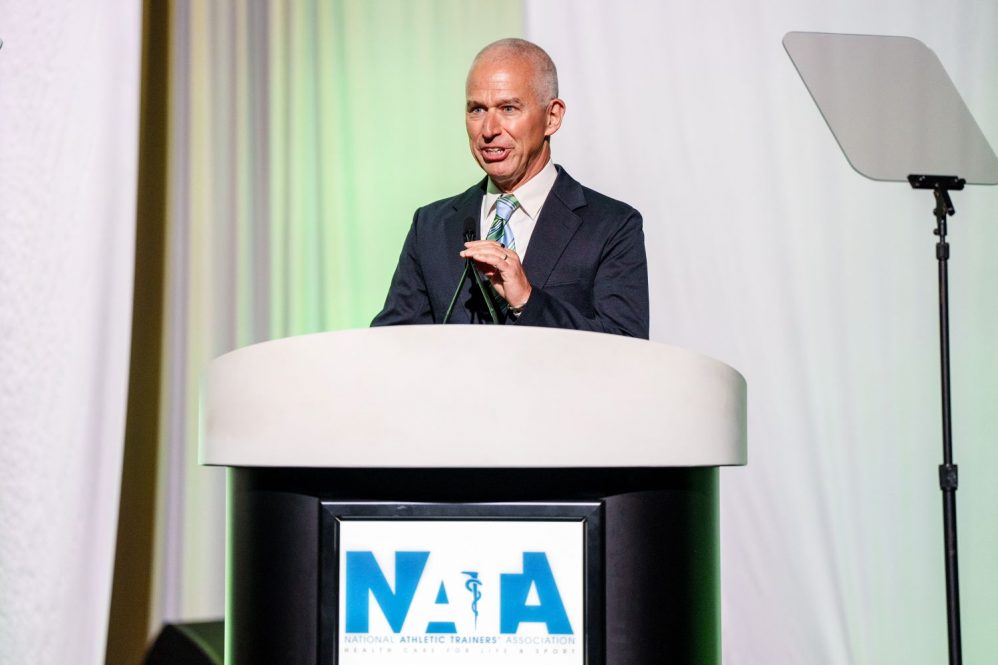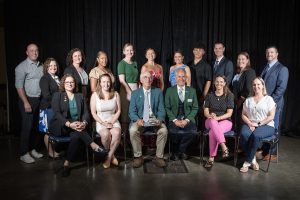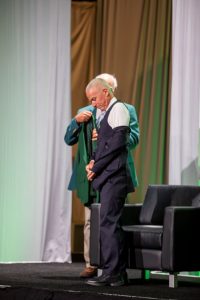Casa is an internationally recognized expert in exertional heat stroke to prevent sudden death during physical activity

CAHNR Board of Trustees Distinguished Professor and CEO of the Korey Stringer Institute Douglas Casa at NATA Hall of Fame Induction (NATA Photo)
Douglas Casa, Board of Trustees Distinguished Professor in CAHNR's Department of Kinesiology, has been inducted into the National Athletic Trainers' Association (NATA) Hall of Fame.
Casa is also the chief executive officer of the Korey Stringer Institute (KSI), the nation's preeminent research and advocacy organization for heat-related studies. KSI is located within UConn's College of Agriculture, Health and Natural Resources (CAHNR).
"Being inducted into the NATA Hall of Fame is certainly a milestone moment for me professionally, but it is really a culmination of having amazing students and colleagues during my 25 years at UConn. I have been blessed to work with 42 past and present Ph.D. students at KSI. They have been the motor that has allowed our operation to create incredible opportunities and products. You only get an honor like this if you have been surrounded by great people willing to put forth enormous effort in the pursuit of a shared goal."

Casa is an internationally recognized expert in exertional heat stroke, hydration, thermal physiology, sport performance monitoring, maximizing performance in heat, sport safety, and public policy regarding the prevention of sudden death during physical activity for a variety of stakeholders.
According to NATA, "the National Athletic Trainers' Association Hall of Fame exists to recognize the very best of our profession. Induction into the Hall of Fame honors athletic trainers who exemplify the mission of NATA through significant, lasting contributions that enhance the quality of health care provided by athletic trainers and advance the profession."
Casa has been affiliated with the Department of Kinesiology for more than two decades. During this time, he established KSI in partnership with Stringer's widow, Kelci Stringer, in 2010. Korey Stringer died a preventable death from exertional heat stroke during a football practice in 2001 with the Minnesota Vikings.
Since then, KSI has grown to include 80 staff members and has been involved in highly productive research, education, and outreach activities. KSI's mission is to provide research, education, advocacy, and consultation to maximize performance, optimize safety, and prevent sudden death for the athlete, warfighter, and laborer.
Casa has a personal connection to his work as well. In August 1985, Casa was competing in a track event at the Empire State Games. As he finished the 10K race, Casa collapsed from exertional heat stroke.

Thankfully, the Games had an athletic trainer on site who quickly implemented life-saving cooling methods and had incredible nurses and physicians who continued the life-saving cooling at the hospital. Because of the amazing care and rapid cooling Casa was able to walk out of the hospital safe and sound.
"The immediate action along the chain of care gave me the best opportunity to live the amazing 39 years I have since that moment," Casa says. "I have dedicated a good portion of those 39 years to paying forward my good fortune, advocating for the best practices for exertional heat stroke, and preventing sudden death in physical activity through our work at KSI."
On June 26 in New Orleans at NATA's annual meeting, Casa's personal experience and lifetime achievements came full circle.
He was presented with his green hall of famers jacket by Kent Scriber, the athletic trainer who initiated the cooling that helped save Casa's life in 1985. Scriber is also a member of the NATA hall of fame.
"Having my family, 21 former Ph.D. students, UConn colleagues, and hundreds of professional colleagues at the induction in New Orleans brought a lot of us to tears. Ever since surviving my exertional heat stroke in 1985, I have been very cognizant to be grateful for the incredible moments I get to experience, and to share it with so many people I love so dearly was probably the best moment of my career."
This work relates to CAHNR's Strategic Vision area focused on Enhancing Health and Well-Being Locally, Nationally, and Globally.






